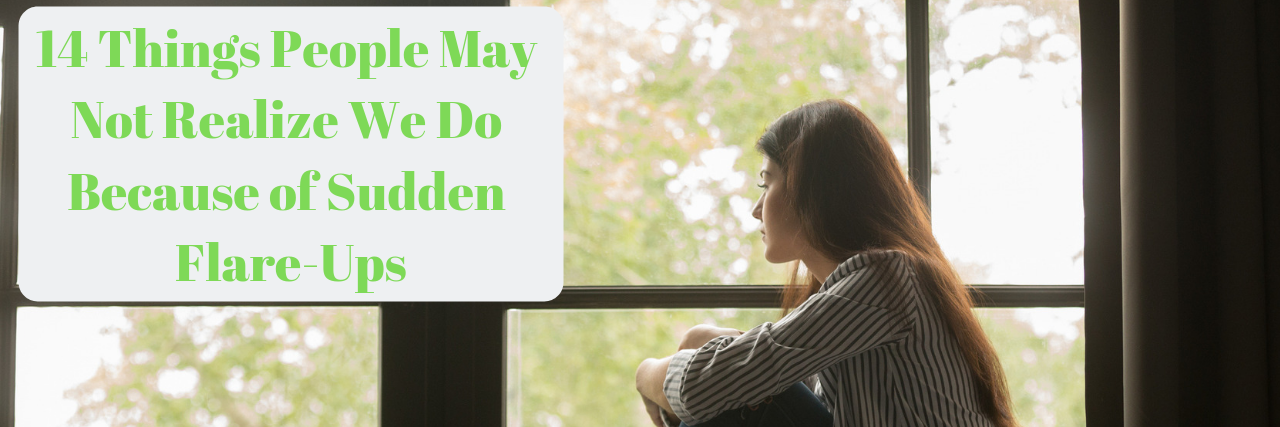14 Things People May Not Realize We Do Because of Sudden Flare-Ups
Living life with a chronic illness is basically living life constantly walking on eggshells. One day you may be bouncing off the walls because you are so full of energy and the next you are lying on the cool bathroom floor — your only source of relief from the agonizing pain you are in. This is an example of what we in the chronic illness world call a “flare-up” — and with it can come fear.
As one Mighty contributor wrote, “flare fear” is “the thought of what might happen if you do too much or choose the wrong activity on a good day, ultimately sending you into a spiral of pain and symptoms and sentencing you to weeks in bed.”
When my chronic Lyme disease flares, I tend to go into what I like to call “survivor mode;” I do anything I can to feel better. Sometimes this means doing a detox regimen, while other times I may have to cancel plans. It can be hard for others to comprehend why I am drinking straight turmeric (or “that gross stuff,” as my sister calls it) or why I can’t go see that movie I really wanted to anymore, and it can get pretty discouraging and lonely. A lot of times, what others don’t understand is that during a flare, we are just trying our best to survive.
To promote more understanding of this flare-up experience, we asked our Mighty community to share something people don’t realize they’re doing because their symptoms have flared up suddenly. If others understand why we do the things we do to feel better, maybe we can cut ourselves some slack for going into “survivor mode” and realize we are not alone.
Here are some things you may not realize people living with chronic illnesses are doing because their symptoms have flared:
1. “Leaving texts as ‘unread’… I saw it, I want to reply, but I’m just not capable of people-ing right now…” — Merri S.
2. “I isolate myself.” — Tracy M.
3. “I get really distant, talking as little as possible and giving short answers. I’ll start to avoid eye contact and focus on something other than people.” — Sarah L.
4. “Hiding in my bedroom!” — Laura H.
5. “I get super cranky from being absolutely exhausted and/or nauseous.” – Lisa G.
6. “Walking slowly. Half the time you can only tell how unwell I am compared to my friends when we walk as a group and I’m a good few feet behind them.” — Sophie E.
Want to connect with other chronic illness warriors in a judgment-free space? Download our free app to more easily ask questions and receive support.
7. “I’ll be resting. I’ll be practicing self-care. Any major activity that needs to be done will not be done quickly or right when it’s convenient for you.” — Letia N.
8. “Changing position a lot (sitting to standing, standing and leaning on things, stretching when I can), snacking (I can’t eat full meals because the pain makes me nauseous), spacing out (because I’m trying to control the pain), fighting, wearing make-up (my grandmother told me if you can’t feel good inside try to look good on the outside. It’ll fool people.).” – Marie D.
9. “Watching my breathing. I have to focus on it to stay calm.” – Tiffany T.
10. “It’s like my body puts itself in energy-saving mode for recovery… No talking to coworkers unless necessary, prioritizing my workload and saving what I can for tomorrow, putting on my essential oil diffuser, taking meds as needed, and dimming the lights around my desk.” — Katelynn I.
11. “Being on edge. I really can’t help but be tense when I’m having a flare.” — Lauren H.
12. “Calling into work saying, ‘I’m throwing up’ (as that’s the only way they’ll not force me to come in), kick my fiancé out of bed, as I can’t stand to be touched, and cry till I fall asleep, and usually I end up sleeping anywhere from 18 to 24 hours in one stretch.” — Kaitlyn Y.
13. “Drag my hand against posts or solid structures, use my cane, or lean against walls in public. Can’t trust my vision or sense of balance so I touch things to remind me the world isn’t moving.” — Katrina O.
14. “I cannot do face-to-face much anymore… but do thrive online, as I have for quite a few years. When things get extra rough, though, whether via pain levels, fatigue, or generally feeling like breathing is difficult, I pull back there, too, and become rather quiet. I just can’t get myself to put the energy into listening to, advising, or conversing with most people, and even those that are an exception, sometimes they get left behind. I feel guilty for it after the fact, but I know, deep down, it’s a survival technique, and one of the very few ways I’ll regain enough energy/strength to get back to being semi-‘normal.’” — Kate V.
You never really know what someone living with a chronic illness is going through. Hopefully, these things can give some insight into what a flare-up is really like, and we can find more understanding and compassion for those living through it.

